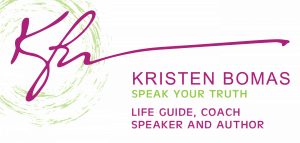


 Kristen Bomas, Life Mastery Guide at Kristen Bomas PA.
Kristen Bomas, Life Mastery Guide at Kristen Bomas PA.
She is a speaker, author, workshop facilitator, licensed psychotherapist, and the creator of The Sage’s Template, a framework for the most anguished and complicated of relationships – the one between yourself and your universe.
By recognizing life always ditches the original plan, her work reveals how fear becomes a bedfellow. Trauma gets the better of us. Contentment sees other people. And divorce from our true nature is therefore inevitable. But we can mend this delicate, fractured bond we have with the world around us. If we’re willing to venture beyond our normal thought patterns and confront what awaits us there.
Connect with Kristen on LinkedIn, Facebook and Twitter.
What You’ll Learn In This Episode
- Communication
- Relationships
- Self Mastery
- Spirituality
- The Sage’s Template
This transcript is machine transcribed by Sonix
TRANSCRIPT
Intro: [00:00:01] Broadcasting live from the Business RadioX studios in South Florida. It’s time for South Florida Business Radio. Now, here’s your host.
Lee Kantor: [00:00:12] Lee Kantor here, another episode of South Florida Business Radio. And this is going to be a good one. But before we get started, it’s important to recognize our sponsor, DIA’s trade law, your customs expert. Today on South Florida Business Radio, we have Kristen Thomas with KristenBomasPA. Welcome.
Kristen Bomas: [00:00:35] Thank you. I am honored to be here.
Lee Kantor: [00:00:38] Well, I’m excited to learn what you’re up to. Tell us about your practice. How are you serving folks?
Kristen Bomas: [00:00:43] Well, I am trained as a psychologist, but my practice has evolved over time. So I’m really working with individuals in the practice who are looking for more out of their life. Their usually their career and their relationships are fairly solid, but they’re not feeling the depth of the happiness that they’re looking for. So in the practice, I’m really working on that, but we’re expanding that into a way to really let everybody participate in self mastery and life mastery, which are my main teachings.
Lee Kantor: [00:01:16] So what’s your back story? How did you get involved in this line of work?
Kristen Bomas: [00:01:20] Well, you know, we go way back. I started off at the University of Florida in chemical engineering on my way to medical school, and I stumbled into the psych building one day just to go to the restroom because it was easier access. And I was intrigued. And when it came time to apply for graduate school of Medical School, I ended up really falling in love with psychology. So I did my doctorate there at the University of Florida, worked on my doctorate there at the University of Florida. And then in my practice, I had an analytic practice that evolved to a point where my clients and me, because as an analyst, you also have to be in therapy, analytic therapy. It evolved to a point that our questions were beyond psychology, and it was during that phase of the practice that I developed a template that I now call the Sages template to teach life. And so it’s been a lot of really interesting twists and turns in my life that brought me to where I am today.
Lee Kantor: [00:02:20] So can you share a little bit about the template? How does the framework work?
Kristen Bomas: [00:02:25] Absolutely. So we’re really looking at self mastery within life mastery. And self mastery is really becoming aware of yourself and those challenges that limit you and really seeking out true freedom in this life. Right. And then life mastery is starting. As you start to get to that point of freedom within yourself, you start to see the connection between you and all of life, and that becomes the life mastery. And it’s a process, it’s not an endpoint. So the Sages template is a very simple way of taking life, narrowing it down into its dualistic model, and then helping you transcend that dualism into a monolithic model to make it even more simply stated, it is a way it offers my clients and audience a way to create greater freedom and love in their lives in a very simple way, difficult to master, but easy to understand and move through.
Lee Kantor: [00:03:22] Now, a lot of our listeners are business people. How would a business person kind of take this information to help them grow their business and maybe help them lead a more balanced, more productive life?
Kristen Bomas: [00:03:36] Well, you know, 90% of my clients are strong professionals. They’re executive officers, business owners, very successful in their careers. And so there are a couple of things. Number one, I do a lot of work with businesses on team development, culture development, because as you start to really understand the communication and the relationships inside life, which is also business, you start to create a more solid foundation for the relationships. We are always in relationship and we are always communicating. And so consequently those two things are happening in business as well. It also I do a lot of executive a lot of executives because they want a greater I don’t really want to use the word balance, but balance between work and play, they don’t sometimes they’ve lost sight of how to play, how to build love in their relationships. Things have become very predictable and familiar, but not enhancing. So for the business community, you know, we are as business professionals, as I am as well, we also have a life once we leave work. So it goes both directions. I can help with the relationships in business and your relationship to your career, but even more importantly, the relationship you have with yourself and with your life as you lead your career and finding that that real, fulfilling space of how they work together.
Lee Kantor: [00:05:02] So what is the typical frustration a new client is coming to you with? Are there some kind of I don’t want to say universal but common themes? That folks that are looking for your solution are suffering from.
Kristen Bomas: [00:05:18] I don’t know that most of them are really suffering as much as the other questions would be. It certainly can be. It’s going to always be relationship oriented in some way, right? It can be relationship oriented. Maybe they are an executive officer in a corporation and they’re really feeling the impact of their position and wanting to develop a greater camaraderie with some of the other executive members. Maybe they’re finding great frustration with some of the other members, so they want to develop those relationships with greater strength. Some are business owners. Some are business owners that are anchored in the land market or the real estate market or the commercial real estate market. And there there’s always the ebb and the flow. How do I use those times where things slow down to my benefit? How do I move beyond that worry that is this going to be like it was before when everything came to a halt? Most people have you know, if you have a lot of money, it doesn’t mean you’re not afraid of losing it. You know, it doesn’t mean that a business owner isn’t also fighting to constantly do better, do better, do better. And they don’t understand why they can’t just be pleased with the success that they have. So a lot of those types of questions come through the door. There are also some more basic questions that come through the door. You know, I’m in a relationship. I don’t know if I should stay with my partner or leave. And that becomes a real balancing act in life as well. And everybody is going through some sort of transition. So if we just generalize it and understand that what we’re really looking at are major transitions in life and people realizing in those periods that their life isn’t as fulfilling as it wants to be, then that’s kind of your it’s kind of what you see coming through the door. It just comes through through various transitions and various questions.
Lee Kantor: [00:07:23] Now, those folks have to be kind of self-aware enough to know, Hey, something’s amiss and I need help. Are there more kind of obvious symptoms? Like if you have a business and you’re having a lot of turnover or you’re, you know, you’re haven’t sold anything for an extended period of time that something’s changed. Are people coming to you when there are, you know, kind of obvious symptoms like and they don’t know. They’re not as self aware to kind of go layers deep and see where it all begins.
Kristen Bomas: [00:08:01] Yes. And that’s a really great question, because there are those things, those symptoms that happen in life and inside the individual that prompt them to know something’s off. Right. And once they know something is off, they’re seeking some sort of support. And my whole practice is word of mouth, you know, for the most part. And so it really works that they they are referred in because the other person to whom they’re speaking knows there’s this is something inside you. Like maybe their whatever is stressing them that has to come from inside them because because the stress is inside them. So usually it’s it’s either they’re not happy and they want to know why they’re frustrated because like you said, the business just isn’t moving in the way they thought it would. And they’re wondering if it’s them relationships with colleagues or friends or family. Aren’t what they think they should be and they don’t know why. So yeah, there are symptoms like that that, that definitely occur. And usually you find yourself talking to a friend and they say like, really, what are you thinking here? Like I was just talking to a friend earlier who had. A challenge with his son, and he was sitting in a place with a bunch of colleagues, actually, it’s a little restaurant in downtown Broward.
Kristen Bomas: [00:09:39] And I seen with a bunch of colleagues talking about how upset he was about his son. And all of a sudden everybody said, you know, you really handled it well. Don’t expect your wife to be in agreement with it, but you handled it really well. And so I get the phone call. So why is it that I’m so worried about? I think I handled this well. Did I handle this well? How do I deal with my wife handling a different not understanding why I handled my son the way I did? And and so those questions come to the table. But you can see how people start to talk. And as they’re talking, they start to realize that, oh, wait, I need more advice on this. And not necessarily advice, but understanding and comprehension so that I can really move forward. And I used a family example on purpose because I think that’s where it really hits home, all puns intended. And I think people see more in their personal life before they they really see it in their business life.
Lee Kantor: [00:10:38] Now, do you have any advice for other people in your field that are looking to maybe scale their business out of the traditional therapist kind of framework in terms of you’re a writer, you’re a teacher, you have you know, you’re building in this online community where you’re doing workshops. How did you kind of rethink the model and expand it in the way that you have? And maybe you can share some of that insight and maybe some of the tactics you use to kind of grow your practice beyond that kind of traditional, you know, one at a time kind of business that therapy has been over the years is yeah.
Kristen Bomas: [00:11:21] Well, like I said, my practice moved beyond traditional questions in the first place so that that kind of set me into a different mode. But, you know, honestly, people can’t afford therapy and our insurance policies really don’t don’t cover therapy in the way that you would wish they did. And there’s just not a real respect for the emotional health in this culture overall, unfortunately. And that’s another soapbox, another day. But so, yeah, I have never taken insurance because of confidentiality. I don’t I work with a lot of people who don’t need their personal business on their insurance records. And and a lot of a lot of people in psychology are starting to not work for insurance because it it doesn’t pay anything. You can’t you can’t live off of what you get paid. And so the question is, it’s a fair question. So what did I do? Well, you know, when you leave insurance behind, most people can’t afford you. And I really want it to be available to everyone who wanted to learn more about self mastery and life mastery. And I started to and I saw how how people received my Sage’s template. And it was remarkable. It was really, oh, so humbling to see. And so how do I get it out to everyone? I love to write, I love to teach. And so it seemed pretty natural for me because it took a tremendous amount of networking and meeting people and advertising and marketing and doing just to get my practice as successful as it is. And it’s a lot of work. And, you know, unlike other businesses, if I leave for a week, I lose that week’s income period. It doesn’t come back in any way, shape and form. So you have to keep going.
Kristen Bomas: [00:13:14] And that’s an exhausting thing for a lot of therapists, and especially if they aren’t fully trained to really not feel the impact of what they do for a living. So it’s for all of my colleagues out there, you know, there are ways that you can open those doors to more people, to creating what you teach in a workshop or a downloadable course. But you have to really know what it is you’re teaching and what you would like to get out to the general public. I think for me, I took what I love. I love people, I love life. I love talking with everybody. You could throw me in the middle of a football stadium and I would feel like I was sitting in a living room. I just love people. And so it was a natural evolution for me. The book that I just got published is was a dream of mine because I really wanted the template to be in anyone’s hands who wanted it without having to pay me an hourly fee. And so it opened up those doors and opened up the opportunity for many people to start to ask questions. That they’ve had inside that couldn’t be answered. And so I think between that social media, between podcasting, blogging, my website, all of all of the different social media sites, you start to touch the lives of many. And if that’s your goal as as a therapist in some way or as a coach in some way, then you just have to start really learning within yourself. What is that experience that you would like to have for yourself and for everyone around you, and then you start to embark upon all these options?
Lee Kantor: [00:14:57] Well, congratulations on all the success. If somebody wants to learn more and about your writing, about your teaching, about your speaking, what is the website? What’s the best way to find you and get a hold of you?
Kristen Bomas: [00:15:10] Well, the website is my name. Christine Bonus. Christine Biomass. That’s pretty much the easiest way to find me on all social media. The book is The Journey of a Sage, and you can go to the journey of a sage and find it directly. You can purchase it on Amazon. You can find a bunch of information on the website as well. So that’s the easiest. And you can always call the office at 5612, one two, seven, five, seven, five.
Lee Kantor: [00:15:39] And then on the website there that lists all the workshops, all your podcasts, the books, anything about you and your work can be found there.
Kristen Bomas: [00:15:50] Absolutely. It certainly can. You can find everything that we’re doing from the Book Study Group to all the podcasts, all of the blogging. Everything is right there in one nice, sweet place. Yes.
Lee Kantor: [00:16:05] Well, thank you again for sharing your story. You’re doing important work and we appreciate you.
Kristen Bomas: [00:16:11] Well, thank you, Lee. I really appreciate the time and the opportunity. I really enjoyed my time. Thank you.
Lee Kantor: [00:16:16] All right. This is Lee Kantor. We’ll see you next time on South Florida Business Radio.














